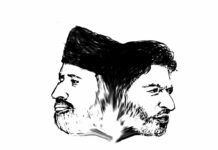 Khursheed Wani
Khursheed Wani
The 2002 assembly elections introduced coalition culture in Jammu and Kashmir’s pro-India polity. The Congress emerged as first constant from Jammu while Peoples Democratic Party (PDP) and National Conference (NC) turned out to be variables from Kashmir. The Congress enjoyed power for 12 years despite getting a meagre number of seats in 2002 and 2008 elections. The watershed 2014 elections changed the scenario. The constant Congress was replaced by BJP that unprecedentedly bagged 25 seats. The Kashmir-centric variables had no choice but to forge an alliance with the new constant. Omar Abdullah tried at the outset but Mufti Sayeed had the best chance (or compulsion) to strike the deal that he did. After Mufti’s demise, Dr Farooq Abdullah wished to play the variable’s role but neither his son is interested for the time being nor PDP has the gumption to sidestep. The BJP is composed. It has attained such a status that as long as the present assembly sustains, it will retain the place of pride. Mehbooba Mufti’s belated affirmation to continue alliance with BJP as per the understanding late Mufti developed and settled in the “sacred document” of the Agenda of Alliance only highlights BJP’s ‘constant’ value.
According to the rule of equations, the constants become insignificant when the value of variables increase. If no ground-shaking development takes place, the values will numerically remain as they are, till the next assembly elections are held in 2020. The question is whether the two variables can increase their value? Omar Abdullah is out of power. He feels his party is gaining value as PDP loses ground. He is willing to go back to the electorate and even childishly prompted Mehbooba to jump the gun. His party, now preparing for organisational polls, claimed fresh registration of 8.5 lakh members. Abdullah is behaving in a matured manner. The reassuring fact for him is that despite having been written off completely in the previous elections, it managed a face saving with 12 seats, some of them snatched from the PDP’s jaws in south Kashmir.
The PDP’s predicament is that its place value is on a down slide. Senior Mufti’s demise exposed the party’s inherent weaknesses. Despite its 16 years of existence and three different roles in governance, the party still looks like a collection of incoherently thinking individuals. If the party failed to mobilise a sizeable gathering on the funeral of its patriarch, or the people chose to stay away, it means there is something very serious with the party’s image or functioning. The party’s leadership could not anticipate the inevitable. There was no ground preparation.
The delay in Mehbooba Mufti’s decision to step into her father’s shoes is also a commentary on the new leadership’s acumen. The initial reluctance due to her mourning was understandable. However, delaying decision and sending conflicting signals created more confusion than resolving it. Naeem Akhtar did not pay a tribute to his political mentor when he picked up holes in implementation of Agenda of Alliance. He plainly forgot his party cannot escape the blame, if at all it is blame-worthy.
Mehbooba was parroting what her father thought or coined to be relevant in Kashmir politics. In Mufti’s physical absence in 2008, she took a decision to pull out of coalition with Congress but it turned out to be a disastrous for her party. The bigger question is whether she can take her own decisions in future to increase her party’s value? If she fails, the variable position of her party will seamlessly shift to NC. There is no third option available.
(The author is senior journalist with The Pioneer.)















